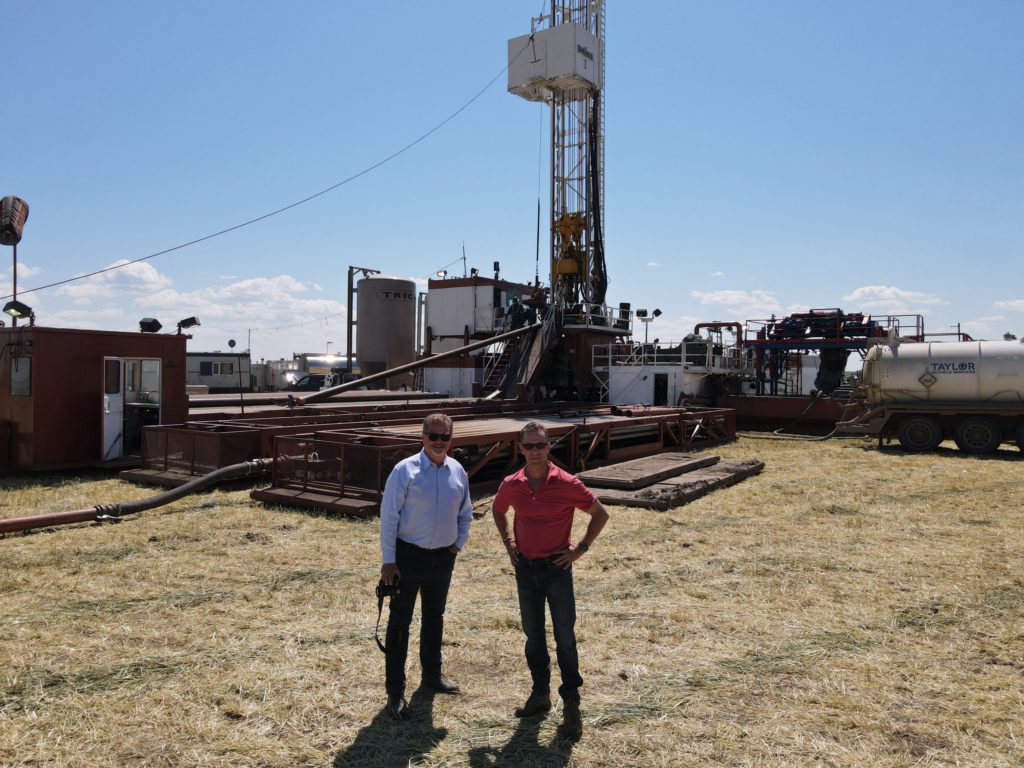JV Article: Grounded Lithium lands Denison Mines as partner to advance Kindersley brine project


Grounded Lithium (TSXV: GRD; US-OTC: GRDAF) has reached an important milestone for the development of its Kindersley lithium brine project in southwestern Saskatchewan. The company signed an option agreement with Denison Mines (TSX: DML; NYSE: DNN) on Jan. 15, giving it the option to earn up to a 75% interest in the project by funding in aggregate up to $15.1 million comprised of cash payments of up to $3.2 million and project spending of up to $12 million through a structured earn-in option.
“Denison is a multi-billion-dollar company saying we like this project,” Grounded Lithium president and CEO Gregg Smith said. “They completed a lot of due diligence on us, and we will be stronger with them by virtue of their financial support and technical expertise.”
Alberta-based Grounded Lithium zeroed in on the Kindersley lithium project in late 2021 because of the shallow depth of its reservoir.
“From our deep roots in the oil and gas industry, we knew that the most important thing is to be a low-cost operator, so we purposely went out and found an area that is shallow, which really reduces our costs,” explained Smith, who was honoured as Saskatchewan Oilman of the Year in 2009.
The top of the reservoir at Kindersley is at a depth of 900 to 1,000 metres whereas the depth to the target in most other areas in the lithium-rich brines of Western Canada are at depths of 2 km and more.
The Kindersley location also has no oil and gas or hydrogen sulphide in the brines, which are contaminants for lithium extraction.
“So, it’s a highly economic project with price resilience that still gives us a positive NPV down to below a price of US$8,000 per tonne (lithium hydroxide),” Smith said.
Grounded published its preliminary economic assessment (PEA) for Kindersley in August 2023, when the price for lithium hydroxide was US$25,000 per tonne, which produces a net present value (NPV) of US$1 billion after tax using an 8% discount rate, and an internal rate of return of 48.5%. The price has plummeted since then to US$15,000 per tonne, forcing high-cost producers to curtail operations, but Smith expects the price to recover as stockpiles are depleted.
At US$25,000 per tonne lithium hydroxide, the project generates after-tax free cash flow of $200 million per year. If Denison exercises its 75% option, that would leave Grounded Lithium with a quarter of that cash flow, but Denison’s funding frees it from raising money in the public markets and diluting shareholder ownership.
“Being a low-cost operator gives us a strategic advantage that allows us to survive when the price is low and do very well when it goes up,” said Smith.
The Kindersley PEA projects annual production of 11,000 tonnes of battery-grade lithium hydroxide monohydrate per year, a project life of 20 years and total capital costs of $447 million.
The PEA was focused on the initial phase of a multi-phased ramp up that would double production in a second phase.
Kindersley boasts a total resource of 4.2 million tonnes of lithium carbonate equivalent of which 1 million tonnes is in the measured and indicated category, based on a November 2023 update to the PEA.
Grounded chose to produce lithium hydroxide monohydrate as opposed to lithium carbonate based on the anticipated demand for the former as battery chemistry preferences evolve.
Current plans call for the use of Koch Technology Solutions’ proprietary and trademarked Li-Pro in-situ extraction technology following extensive research and initial results from testing thousands of litres of brine pumped from the Kindersley reservoir. Denison is pioneering in-situ extraction technology at its Wheeler River uranium project in northern Saskatchewan and will be able to share that experience and expertise at Kindersley.
Smith sees huge potential for lithium production from brines in Western Canada’s sedimentary basins because of the lower cost of production and less onerous permitting compared with mining hard rock lithium deposits.
“I’m not saying don’t do hard rock as well, but we think there’s a strategic advantage to mining lithium from brines,” he said.
Although still a minor player in global lithium production compared with many other jurisdictions, Canada has several advantages in developing new supply, including stable governments and high environmental standards. Additionally, said Smith, Canadian producers like Grounded Lithium would benefit from the U.S. Inflation Reduction Act, which grants credits to consumers for the purchase of battery powered vehicles on critical minerals sourced and processed in a country that is not a foreign entity of concern for the U.S.
“Next steps for the Kindersley project,” said Smith, “include a pilot plant and a feasibility study, leading us eventually to pursue offtake agreements along with project financing for possible construction starting as early as 2026.”
The preceding Joint Venture Article is PROMOTED CONTENT sponsored by Grounded Lithium and produced in co-operation with The Northern Miner. Visit: www.groundedlithium.com for more information.
Comments